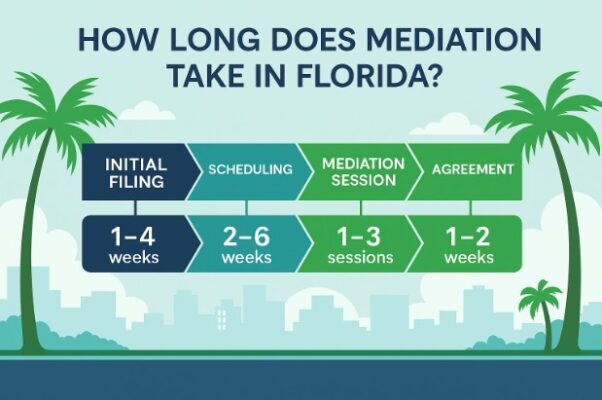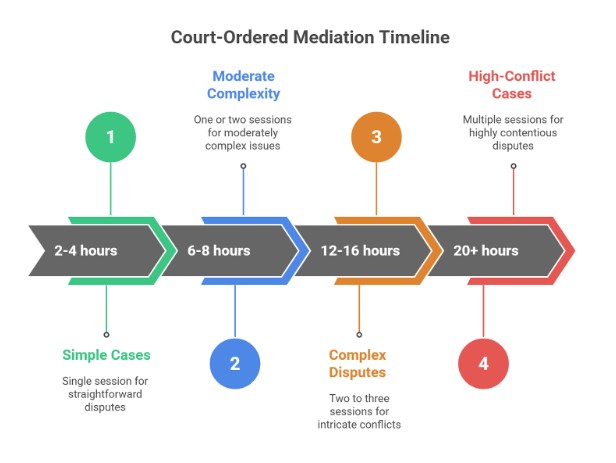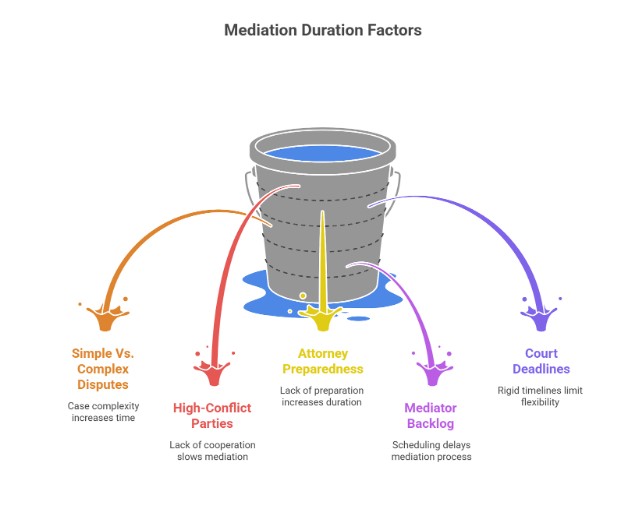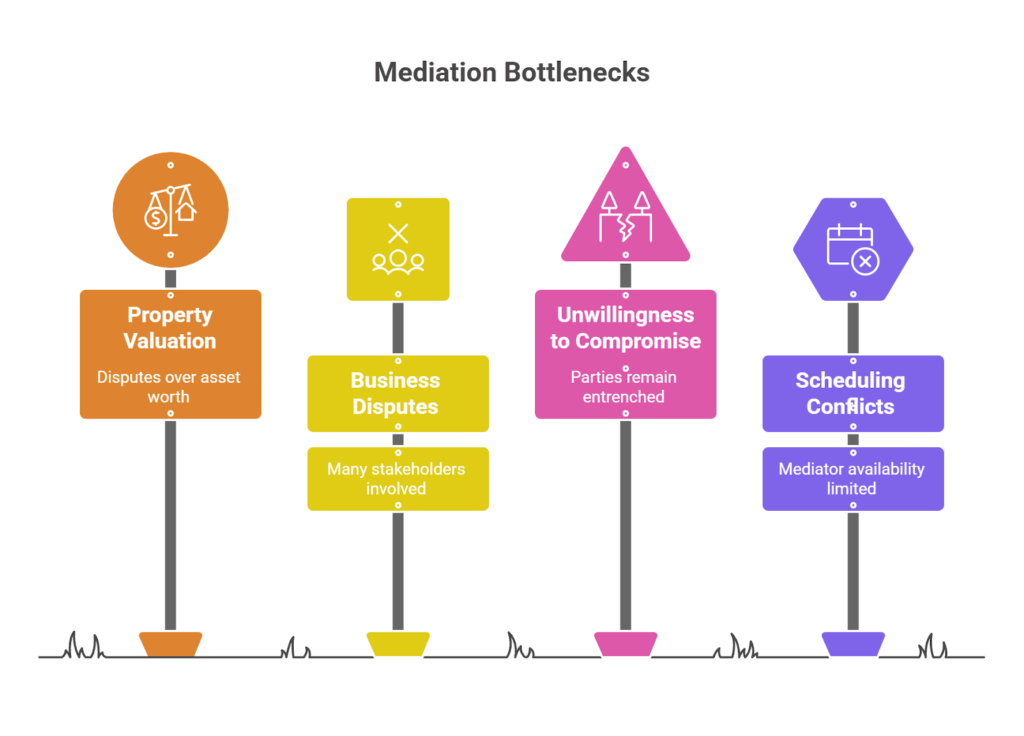

When you’re facing a legal dispute in Florida, one of the first questions is, “How long will mediation actually take?
Most mediation sessions in Florida run anywhere from a couple of hours to several days. Still, a typical first session usually lasts between 2 and 3 hours, depending on the complexity of your issues.
Mediation can be quick or drag on—it depends on a few key things. If your case is complex or has lots of disputes, expect it to take longer than a simple disagreement.
The number of people involved also matters. More participants mean more priorities and interests to juggle.
Florida’s mediation system offers families and businesses a faster and more affordable alternative to going to court. If you know what to expect, you can walk in with more confidence—and maybe a little less stress.
Table of Contents
Key Takeaways
- Mediation sessions typically last a few hours to several days, depending on the complexity of the issues.
- Court-ordered and private mediation follow different schedules, which impact the overall duration of the process.
- Preparation and cooperation can significantly speed up the process.
Typical Mediation Timeline In Florida
Timelines for mediation in Florida swing a lot depending on your case. Family disputes typically require 2-3 hours for the initial session, and most are resolved within a day—unless complications arise.
Family, Civil, And Business Cases Average Timelines
Family law mediation in Florida often takes 2-4 hours for straightforward issues. Divorce mediation with property or custody issues can last a full day.
More complex family cases may require multiple sessions to resolve all issues. If it’s an uncontested divorce, you’ll probably finish quicker than if you’re fighting over every detail.
Civil litigation mediation usually goes for 4-8 hours. If liability is clear in a personal injury case, you might be done in half a day, but with more parties, you’re looking at full-day sessions.
Business disputes are all over the place. Partnership breakups can take 6-10 hours and often need more than one meeting. Commercial real estate issues can sometimes be resolved in a single day.
Average Session Lengths:
- Simple family cases: 2-4 hours
- Complex divorce: 6-8 hours
- Civil litigation: 4-8 hours
- Business disputes: 6-12 hours
Half-Day Vs. Full-Day Sessions
A half-day mediation (3-4 hours) is most effective for straightforward cases. If you and the other side already agree on most things, you probably don’t need a marathon session.
Mediators often book morning or afternoon blocks, so you can still have a life that day. That’s a plus.
Full-day sessions (up to 8-10 hours) provide ample time to delve into every detail. If your case is complex, you’ll appreciate the extra breathing room.
Full days help you avoid making rushed decisions. You can step out, call your attorney, or just take a breather before agreeing to anything.
Session Comparison:
- Half-day: 3-4 hours, simple cases, lower cost
- Full-day: 8-10 hours, complex matters, more thorough
Typical Scheduling Turnaround After Court Order Or Private Request
Court-ordered mediation in Florida is usually scheduled within 30-45 days after the order is issued. Courts provide lists of certified mediators for you to choose from.
If you’re going private, you can often get a date within a week or two. Working directly with a mediator keeps things moving.
Some mediators are in high demand. Family law mediators in busy seasons might book out 4-6 weeks in advance.
If it’s urgent, you can sometimes get mediation in just a few days. Courts will expedite emergencies, such as temporary custody or business injunctions.
Scheduling Timeframes:
- Court-ordered: 30-45 days
- Private request: 1-2 weeks
- Popular mediators: 4-6 weeks
- Emergency cases: 2-5 days
Rural counties have fewer mediators, so you might wait 60-90 days for court-ordered mediation in those areas. That’s just how it goes sometimes.
If you’re ready to get started, call us now!
Court-Ordered Mediation Timeline

Court-ordered mediation must follow judicial deadlines, often scheduled within 60–90 days after a judge’s referral.
When Courts Require Mediation
Florida courts order mediation in most civil cases before trial. Family law cases—such as divorce, custody, and support—almost always require mediation as a first step.
Personal injury, contract disputes, and property disputes usually receive mandatory mediation orders as well. The court wants you to try settling before burning up court time and money.
Common cases requiring mediation include:
- Divorce and separation
- Child custody disputes
- Personal injury claims
- Contract disagreements
- Property disputes
- Business conflicts
Judges send out mediation orders about 30 to 60 days after you file. They’ll tell you when you have to be done.
Most courts give you 90 to 120 days to finish the mediation process. Miss the deadline, and you could face sanctions or even have your case dismissed.
How Long Court-Ordered Mediation Takes
Case complexity really drives how long you’ll be at the table. Simple disputes can sometimes be settled in just a few hours.
However, if you have multiple parties or complicated issues, you may need several full days split over multiple sessions. Business disputes and family cases involving substantial assets typically take longer.
Typical timeframes include:
- Simple cases: 2-4 hours, one session
- Moderate complexity: 6-8 hours, 1-2 sessions
- Complex disputes: 12-16 hours, 2-3 sessions
- High-conflict cases: 20+ hours, multiple sessions
Scheduling can take weeks or even months, depending on the mediator’s and the court’s workload. In bigger cities, you might wait longer just because everyone’s booked up.
If both sides want to negotiate, you’ll move faster. Stubbornness or hostility can drag things out—no surprise there.
Private Mediation Timeline In Florida
Private mediation allows faster scheduling—often within weeks—since parties choose the mediator and session date directly.
Initial Consultation & Scheduling
It all begins with an initial consultation, which typically lasts 30 to 60 minutes. The mediator will guide you through the process and answer any questions you may have.
Scheduling flexibility is a big perk of private mediation. You can often book your first session within one to two weeks after your initial meeting. That’s way faster than waiting around for a court date.
The mediator will coordinate with everyone to find dates that fit. They’ll even do evenings, weekends, or longer blocks if needed.
- Evening sessions
- Weekend appointments
- Extended time blocks
- Multiple session scheduling
You typically have 3 to 7 days between the consultation and the first session to gather paperwork and determine your goals. That’s not a ton of time, but it keeps things moving.
Session Length & Follow-Up
First mediation sessions in Florida generally last 2 to 3 hours, depending on how many issues you’re dealing with. Private sessions can last longer since there are no strict time limits.
Session frequency depends on how complicated your dispute is:
- Simple disputes: 1-2 sessions
- Family matters: 2-4 sessions
- Business conflicts: 3-6 sessions
Follow-up sessions are usually scheduled 1 to 2 weeks apart. That gives everyone a chance to review what has been discussed and consult with their attorneys if needed.
Final paperwork typically takes 3 to 5 business days to complete after the last session. The mediator writes up the agreement, spelling out what you both decided.
Private mediation typically concludes within 30 to 60 days, from start to finish. That’s pretty quick compared to other options in Florida.
Factors That Influence Mediation Duration

How long mediation takes in Florida depends on a handful of things: case complexity, how willing everyone is to cooperate, attorney prep, mediator availability, and whether you’re doing court-ordered or private mediation.
Tough disputes and poor communication can prolong things—sometimes significantly.
Simple Vs. Complex Disputes
Simple disputes with just one or two issues often settle in a single session that lasts 4 to 8 hours. These cases typically involve straightforward property splits or custody arrangements.
More complicated cases—such as multiple disputes or significant amounts of money at stake—require several sessions over weeks or even months. Business valuations, complex assets, or international custody? Expect to spend more time reviewing documents and weighing decisions.
Simple Case Examples:
- Single property disputes
- Basic child support modifications
- Simple contract disagreements
Complex Case Examples:
- Multi-million dollar business divisions
- International custody disputes
- Cases with hidden assets
Case complexity really drives how long mediation takes, especially if you can’t agree on the big stuff.
High-Conflict Vs. Cooperative Parties
Parties who communicate respectfully in cooperative settings usually complete mediation quickly. They focus on solving problems instead of blaming each other.
These folks work together to find solutions. It’s honestly refreshing when people can set aside their frustrations and just get things done.
High-conflict situations require more time and considerable patience. When parties struggle to talk or have deep emotional wounds, mediators spend extra time managing tension and guiding the conversation.
Signs of Cooperative Parties:
- Respectful communication
- Focus on children’s needs
- Willingness to compromise
High-Conflict Indicators:
- Frequent interruptions
- Personal attacks
- Unwillingness to negotiate
Emotions, power differences, and the nature of the relationship between people can significantly impact the duration of mediation.
Attorney And Client Preparedness
Attorneys and clients who arrive prepared tend to progress through mediation more efficiently.
If attorneys gather all the necessary documents ahead of time and clients know what they want, sessions flow more smoothly.
When people aren’t ready, things drag out. Missing financial records or fuzzy priorities can slow everything down.
Preparation Checklist:
- All financial documents are organized
- Clear goals established
- Legal advice obtained
- Realistic expectations set
Attorneys who regularly handle mediation help clients prepare and guide them through the process more smoothly.
Mediator’s Scheduling Backlog
Popular mediators often have waiting lists—sometimes you’re looking at weeks before you can even start. In Florida, experienced family law mediators typically book appointments 2-4 weeks in advance.
When everyone’s busy, scheduling gets tricky. Aligning the calendars of parties, attorneys, and mediators can further delay the process.
Party availability, scheduling conflicts, and the mediator’s calendar all play a significant role in determining how quickly mediation is scheduled.
Average Wait Times:
- Experienced mediators: 2-4 weeks
- Court-appointed mediators: 1-3 weeks
- Specialized mediators: 4-6 weeks
Court Deadlines Vs. Private Flexibility
Court-ordered mediation comes with strict deadlines—usually, you have 45-90 days to complete it. That pressure can push people to resolve things quickly, but it doesn’t always give enough time for complicated cases.
Private mediation offers greater flexibility. You can take breaks, work around jobs, and move at a pace that actually works for everyone.
Court-Ordered Timeline:
- Must complete within the court deadline
- Limited rescheduling options
- Fixed number of sessions
Private Mediation Benefits:
- Flexible scheduling
- No artificial deadlines
- Unlimited sessions if needed
Business disputes don’t have to drag on for months. The Mediation Group, Inc. helps resolve conflicts quickly through mediation. Protect relationships and reduce delays—contact us now to schedule.
If you’re ready to get started, call us now!
Step-by-Step Mediation Timeline Example
A typical Florida mediation timeline typically follows four main steps, from initial request to settlement.
| Step | Timeline (Typical) | What Happens |
| Initial filing/request | Day 1–14 | Parties agree or court orders mediation |
| Scheduling | 2–6 weeks | The mediator and attorneys coordinate the date |
| Mediation session(s) | 1 day or multiple half-days | Negotiation and resolution attempt |
| Agreement finalization | 1–2 weeks | Settlement filed with the court or signed privately |
How To Speed Up The Mediation Process
Parties can often cut their mediation timeline from months to weeks by being proactive before and during sessions.
Preparation, focused talks, tech tools, and the selection of a skilled mediator make the biggest difference.
Exchange Necessary Documents Early
Getting documents ready is probably the number one cause of mediation delays. Gather your financial records, contracts, and any other relevant documents at least two weeks before the first session.
Essential documents include:
- Tax returns from the past three years
- Bank statements and investment accounts
- Property deeds and mortgage information
- Business records and valuations
- Insurance policies and beneficiary forms
If you turn in paperwork late, mediators usually have to reschedule. That can mean weeks between meetings—nobody wants that.
Organizing paperwork early saves both time and money. Digital copies make things even easier and faster.
Some mediators set deadlines for document exchange. Miss those, and you might delay everything by a month or two.
Narrow Disputes To Core Issues
The most effective mediations focus on the most significant disagreements first. Figure out your top three priorities before you walk in the door.
Minor issues often resolve themselves after the major issues are settled. Spending hours on small disputes just eats up time and money.
High-priority issues typically include:
- Child custody and parenting time
- Property division and asset allocation
- Spousal support amounts and duration
- Business ownership and valuation
Attorneys should help clients separate what’s emotional from what’s actually a legal issue. Otherwise, sessions can get stuck in old arguments.
Having a written agenda keeps things on track. Mediators can step in if the conversation starts to wander.
Use Virtual Mediation To Avoid Delays
Online mediation really helps with scheduling. You can join from home or work, no commute required.
Virtual sessions are often scheduled more quickly than in-person ones. Mediators have more flexibility when they don’t need to book a physical space.
Benefits of virtual mediation:
- Sessions can start earlier or end later
- No travel time between locations
- Easier to fit around work schedules
- Lower mediation fees (less overhead)
- Documents can be shared instantly on screen
Tech issues almost never cause major delays if everyone tests their setup beforehand. Most platforms work fine with a basic internet connection.
Some complicated cases still work better face-to-face. However, for routine tasks, video calls suffice.
Pick Mediators With Availability And Relevant Experience
Your mediator can make or break how fast things move. Someone who knows your type of case will get to the heart of the issues much quicker.
Busy mediators with packed schedules can prolong the process for months. Always check availability before committing.
Key factors for mediator selection:
- Availability within 2-3 weeks
- Experience in the specific legal area
- Track record of timely case resolution
- Flexible scheduling options
Specialized knowledge cuts down on wasted time. A family law mediator, for example, handles divorce issues more effectively than a generalist.
Some mediators offer “intensive” days—full-day sessions that can wrap up things that would otherwise take months.
The mediator’s communication style matters, too. Clear, direct individuals keep things moving instead of letting discussions spiral out of control.
When Mediation Takes Longer Than Expected

Some mediations just take longer than anyone expects. Complex assets, lots of parties, stubborn stances, or even just tough scheduling can stretch things out for weeks or months.
Property/Business Valuations In Divorce
Divorces with significant assets often need professional appraisals. That can mean months of waiting for reports on real estate, businesses, or investments.
Common valuation delays include:
- Commercial real estate appraisals (30-60 days)
- Business valuations with financial audits (60-90 days)
- Retirement account assessments (14-30 days)
- Art, jewelry, or collectible appraisals (21-45 days)
The complexity of high-net-worth divorces means couples must wait for all the expert reports before they can effectively negotiate.
Forensic accountants may need to investigate hidden assets or unravel complex business structures. Such an investigation can easily take months.
Even once you have the numbers, people often disagree with the results. Sometimes you need a second appraisal or even expert testimony, which adds more time.
Large-Scale Business Disputes With Multiple Stakeholders
Business mediations involving multiple parties can be challenging to schedule. Each stakeholder has their own priorities, and getting everyone on the same page is a challenge.
Partnership disputes involving multiple owners necessitate thorough reviews of documents and financial records. Every partner’s contribution, profit-sharing arrangement, and exit terms must be finalized.
Factors that extend business mediation:
- Multiple attorney schedules to coordinate
- Complex contracts requiring detailed review
- Financial records spanning several years
- Regulatory compliance considerations
Corporate disputes often bring in technical issues and expert witnesses. Insurance, intellectual property, and regulations just pile on the complexity.
The number of parties involved really stretches out the timeline. More people mean more opinions and longer negotiations.
Parties Unwilling To Compromise
Mediation hits a wall when folks won’t budge. Emotional disputes—especially in family law—can lock people into stubborn positions.
Some people walk in with unrealistic expectations. They might demand things no reasonable mediator would support, and sessions just stall.
Signs of unwillingness to compromise:
- Refusing reasonable settlement offers
- Making demands that increase over time
- Walking out of mediation sessions
- Focusing on blame rather than solutions
Personal injury cases sometimes involve parties convinced their case is worth far more than it actually is. That mindset can lead to several failed attempts at mediation.
Mediators often require multiple sessions to help individuals understand the risks of prolonging court proceedings. It’s not quick, but sometimes it’s the only way to get people to budge.
Mediator Scheduling Conflicts
Popular mediators often become booked up, which can result in waiting weeks or months. Some parties would rather wait for their top choice than settle for someone with an open slot.
Court-ordered deadlines sometimes clash with mediator calendars. People then have to choose between their preferred mediator and meeting the court’s timeline.
Scheduling challenges include:
- Holiday blackout periods
- Mediator vacation schedules
- Attorney calendar conflicts
- Expert witness availability
Multi-day mediations require everyone to be available for several consecutive days. The more days you need, the more challenging it becomes to find a match.
Some mediators specialize and charge premium fees. Their limited availability can add delays, but many people think the wait is worth it for their expertise.
Last-minute cancellations by anyone can push mediation dates out even further. Travel and facility bookings have to be redone, which is a headache for everyone involved.
Conclusion
The mediation timeline in Florida really depends on a few key things. Some cases are resolved in just a few hours, while others may take several days to conclude.
First mediation sessions typically last 2 to 3 hours in Florida. If you’re dealing with a simple dispute, you might get it done quickly, but more tangled family or business matters usually need a few sessions.
It helps a lot if participants show up prepared. Bring your documents and clearly understand what you want to achieve from the process.
The parties’ ability and willingness to negotiate really set the pace. When everyone’s open to compromise, things can move along much faster.
Florida’s mediation system allows individuals to set their own pace, unlike the traditional court process. You can pick times that actually work for everyone, which is honestly a relief.
Benefits of understanding mediation timelines:
- Better scheduling and planning
- Realistic expectations
- Reduced stress and anxiety
- More effective preparation
If you’re considering mediation, discuss timelines with your chosen mediator. Every case is different, and sometimes, things just take the time they take.
When families need a timely resolution, The Mediation Group, Inc. offers family mediation designed to save months of waiting. Take control of your timeline—contact us today to schedule.
Contact Us Today For An Appointment
Frequently Asked Questions
How long does mediation take in Florida?
Most mediations conclude within 1–3 sessions. The entire process typically takes between a few weeks and a few months, depending on the case’s complexity and scheduling.
How soon after filing is mediation scheduled?
Court-ordered mediation is usually scheduled within 30–90 days. Private mediation can be arranged faster, often within 2–4 weeks.
Can mediation be completed in one day?
Yes. Many disputes, including small family or civil matters, are resolved in a single full-day mediation session.
Does mediation take less time than litigation?
Yes. Mediation can be completed in weeks or months, while litigation may take months or years due to court schedules and potential appeals.
What factors can delay mediation in Florida?
Delays may occur if parties are unprepared, disputes involve complex financial matters, or multiple mediation sessions are required.
Is private mediation faster than court-ordered mediation?
Yes. Private mediation helps alleviate court backlogs, allowing parties to select their own mediators and dates directly, often reducing the timeline by half.
How long does divorce mediation take in Florida?
Divorce mediation typically involves 1–3 sessions, with cases usually resolved within 2–3 months, depending on the complexity of assets, the presence of children, and the level of cooperation.
What happens if mediation doesn’t resolve the dispute?
If mediation fails, the case returns to litigation, resulting in additional time and costs. However, many cases settle during or shortly after mediation.